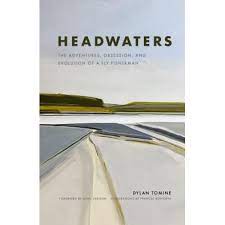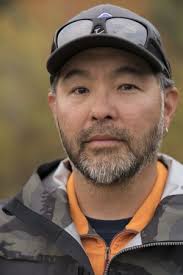
Headwaters
by Dylan Tomine
Patagonia Books
256 pages
Call me a crank with a tender tummy, but destination angling memoirs make me queasy. It’s not because I lack a bulging bank account or connections with gear manufacturers and tackle retailers. Nor is it my lack of media credentials to fulfill a tacit quid-pro-quo contract of complementary travel, accommodation and angling access in return for glowing advertorial reportage aimed at anglers with deep pockets. After all, the monetization and commercialization of angling has been around for a while. Still, the thought of the last wild game fisheries becoming celebrity playgrounds for the rich and famous saddens me beyond words.
My squeamishness is not limited to ethics, honed over four decades as a newspaperman when so-called ‘freebies’ and chequebook journalism were condemned. I simply have no interest in tourist accounts that exploit cliches and stereotypes, punctuated with a few obsequious details in the name of local colour. I don’t need to have preconceptions confirmed by cursory observations in the field. After all, when an angling scribe gains exclusive access to a desirable fishing destination—invariably located in one of the few remaining wild places on our beleaguered planet—a reader usually gets what he expects: spectacular fishing amidst spectacular scenery, complete with obligatory rustic inconvenience serving as humorous foil, charmingly eccentric guides and, last but not least, delicious local cuisine and beverages served after an unforgettable day on waters that have never seen an artificial fly.
Despite these reservations, there are a few writers who circumvent the globe in search of angling adventure and exotica who I find irresistible, for two essential reasons. First, they pierce the superficial and obvious with insight, sympathy and precision, guiding a reader to what D. H. Lawrence called ‘the spirit of place’. Second, they write beautifully, what Hemingway termed ‘grace under pressure.’ Some of the writers I have in mind include Thomas McGuane (The Longest Silence), Philip Caputo (In the Shadows of the Morning), David Profumo (The Lightning Thread) and Charles Rangeley-Wilson (Somewhere Else and The Accidental Angler).
To this select company I would add Dylan Tomine on the strength of his accomplished sophomore memoir Headwaters. Subtitled The Adventures, Obsession and Evolution of a Fly Fisherman, it follows his earlier memoir, Closer to the Ground: An Outdoor Family’s Year on the Water, in the Woods and at the Table. He was born, raised and continues to reside in the American Pacific Northwest while devoting his life to outdoor pursuits. Formerly a fly fishing guide, he’s a conservation advocate and trustee with The Wild Steelhead Coalition, a documentary film producer (Artifishal, DamNation and Chrome) and a freelance writer (The Flyfish Journal, Fly Fisherman, Fish & Fly, Wild on the Fly, Adventure Journal, The Drake and New York Times).
Comprised for the most part of previously published magazine articles and arranged chronologically, Headwaters boasts a rich brocade of narrative threads: one chronicles angling adventures in far-flung places including the Russian Arctic, Argentine Patagonia, Christmas Island, Outer Banks, Japan, Cuba, Alaska and British Columbia; the other traces experiences closer to home, where his angling ‘affliction’ began in childhood on the Skykomish River and has been sustained through adulthood. For as he writes, ‘Fishing was never a sport, a pastime or hobby. It was, and continues to be, who I am.’

A self-confessed ‘steelhead bum,’ Tomine also fishes with equal enthusiasm for various freshwater game fish including trout, salmon and bass, in addition to numerous saltwater species. Tying these narrative threads together are sundry illustrations of pencil drawings by Frances B. Ashforth and brief diary entries tracing his growth from obsessive and fanatical angler to conscientious and enlightened angler as he introduces his son and daughter to the activity that has shaped, and continues to define, their father. These are not gratuitous character sketches to flesh out the memoir, but rather reveal the quality and nature of the person casting the fly rod, thus enriching and enhancing a reader’s appreciation of Headwaters.
Tomine gained my respect by acknowledging that his globe-trotting adventures came in part by virtue of his being a fly fishing ambassador for Patagonia. His incredulous response to good fortune, not to mention modesty and self-deprecating humour, made it easy for me to accompany him on his travels as he eloquently examines the good, the bad and the ugly. Likewise I eagerly succumbed to his intoxicating prose:
Why, as several friends have asked, would anyone want to travel so far to fish a huge river in a place famous for wind, for fish that aren’t necessarily any bigger or more numerous than you find somewhere closer to home.
Why, indeed? Any angler worthy of the title would applaud his answer:
Maybe it’s because the Rio Santa Cruz is an adventure unlike any other in fly fishing, with an opportunity to pioneer a section of river that’s hardly been fished, in a breathtakingly isolated setting. There are literally hundreds of runs and pools on this river that remain untouched, and it would take a lifetime to fish and name them all. Or it could be the fish themselves, a unique run of introduced wild Atlantic steelhead that are just now in the process of evolving and filling their niche.
Considering my reservations about travelogue angling memoirs, it should come as no surprise that the essays I most admire are ones devoted to Tomine’s home waters, which reside in his heart, if not his soul, because they are native grounds to dramatically declining populations of wild steelhead. The intimacy and deep affection with which he describes these waters and their native fish is matched by the passion, knowledge and eloquence with which he defends them against ‘the same old man-can-do-better-than-Mother Nature hubris.’
His anger is palpable when he deplores the arrogance and vanity that fuels ‘the mistaken idea that we (can) somehow, in the face of all our habitat destruction, engineer our way to abundant trout and salmon.’ As our endangered planet suffers the consequences of climate change, extreme weather, over-fishing, mismanaged fish stocking, toxic salmon farming, migration of invasive species and construction of dams, Headwaters becomes essential reading for all who cast pole or rod, a reminder that angling is an imaginative act, an ethical practice, an imperative of conscience, an obligation of stewardship. As such, his first-hand account, accumulated over many years, is a compelling companion to Tucker Malarkey’s Stronghold, which examines the Pacific Rim wild salmon fishery.
When an angling writer turns his pen (or keyboard) to the possible extinction of wild native fish, a solemn patina is unavoidable. Tomine is no exception as his memoir deepens and grows richer, sadder and more poignant, approaching requiem, if not eulogy—a remembrance of things as they once were and are unlikely to be again.
This book review was written originally for Classic Angling, Great Britain’s premium fishing journal.